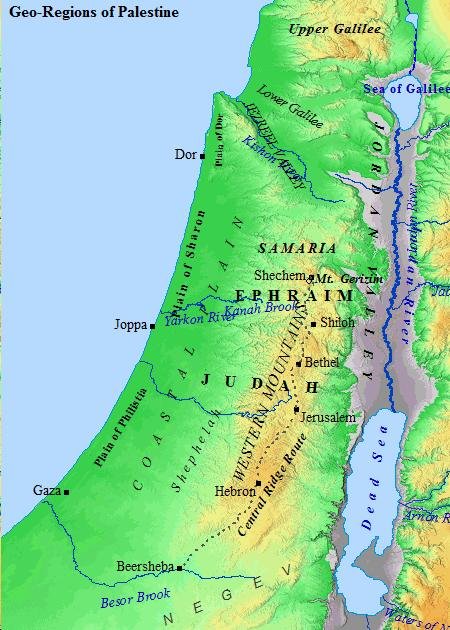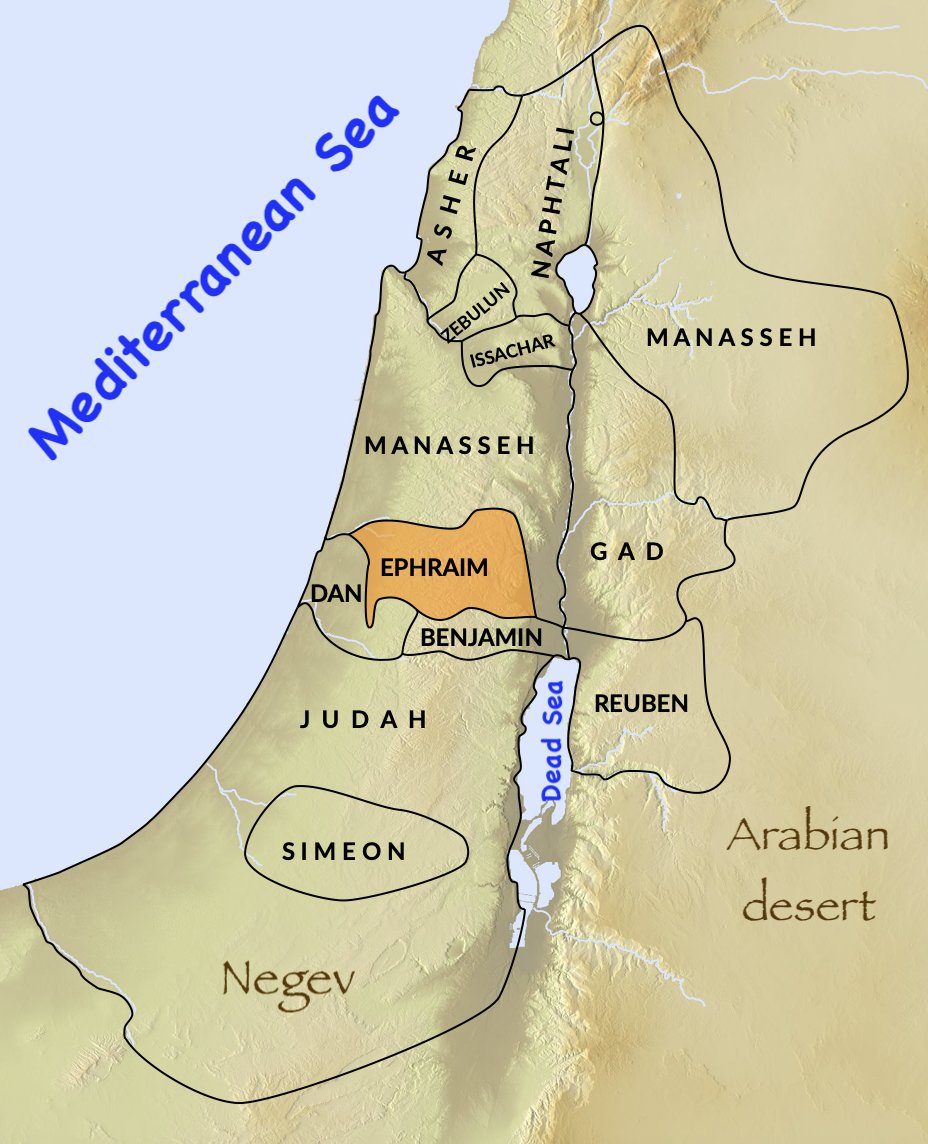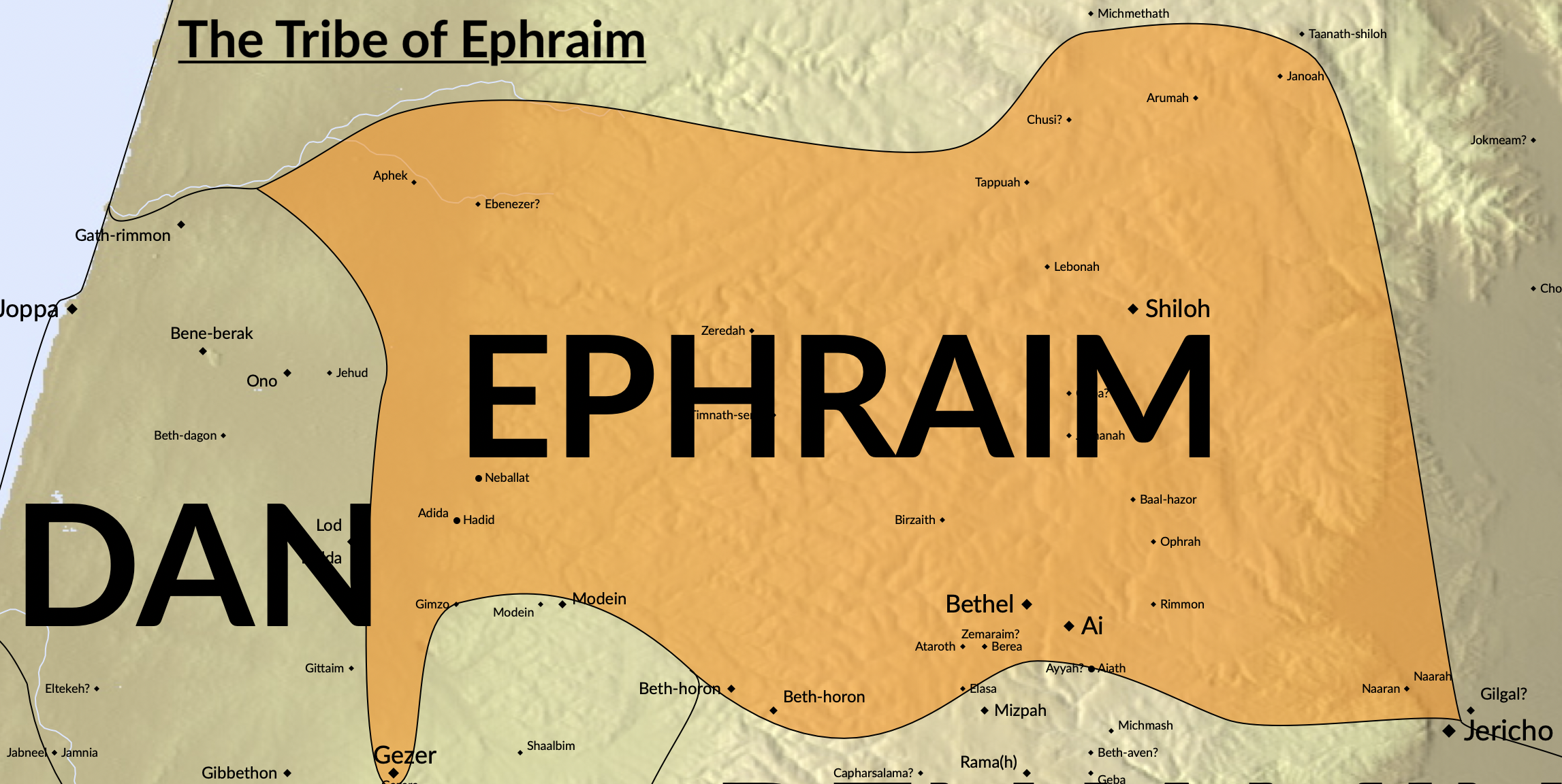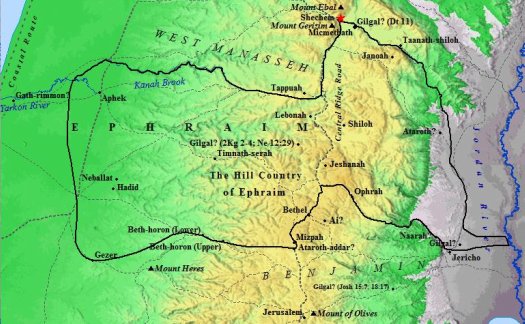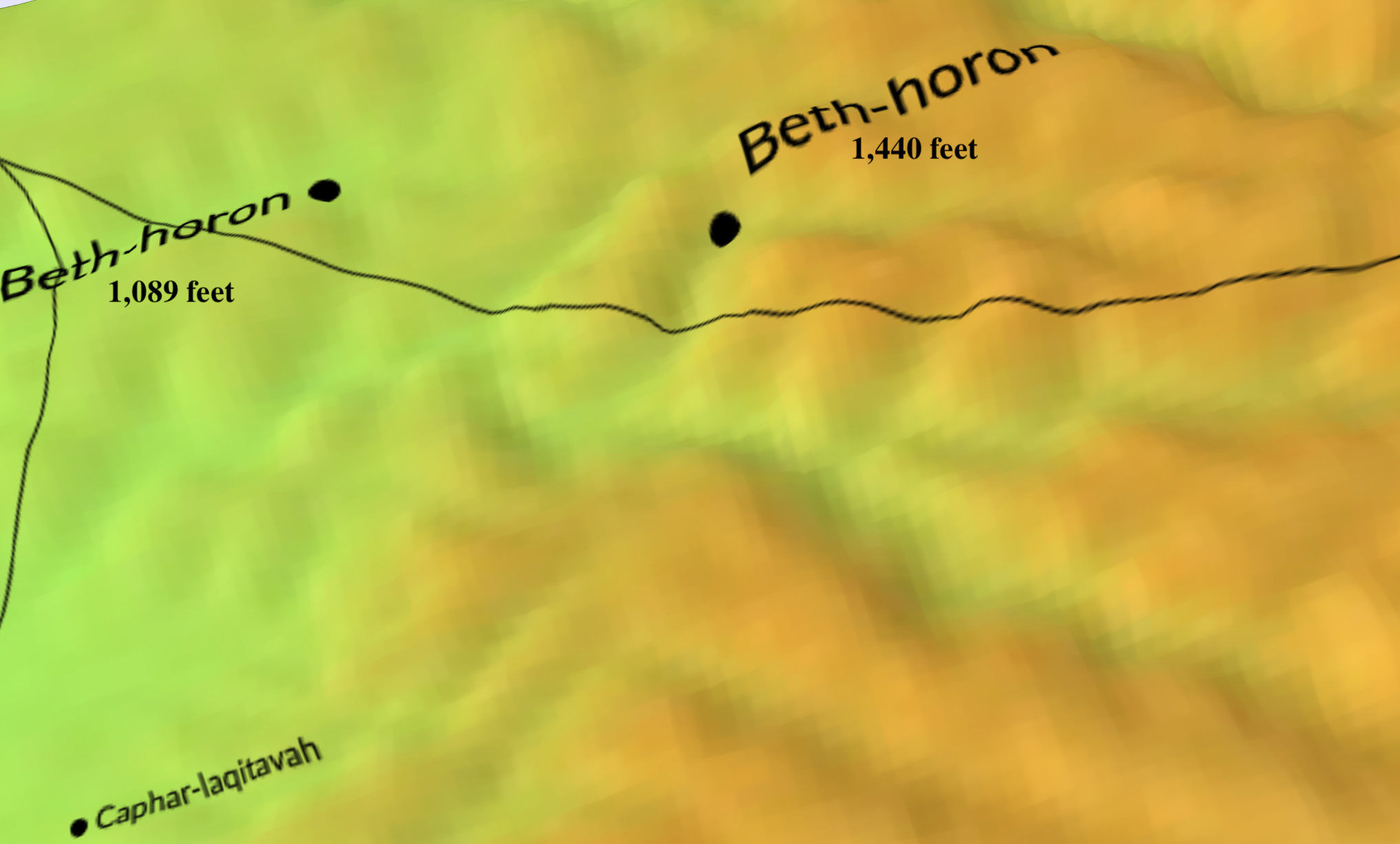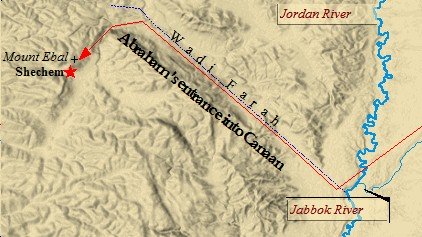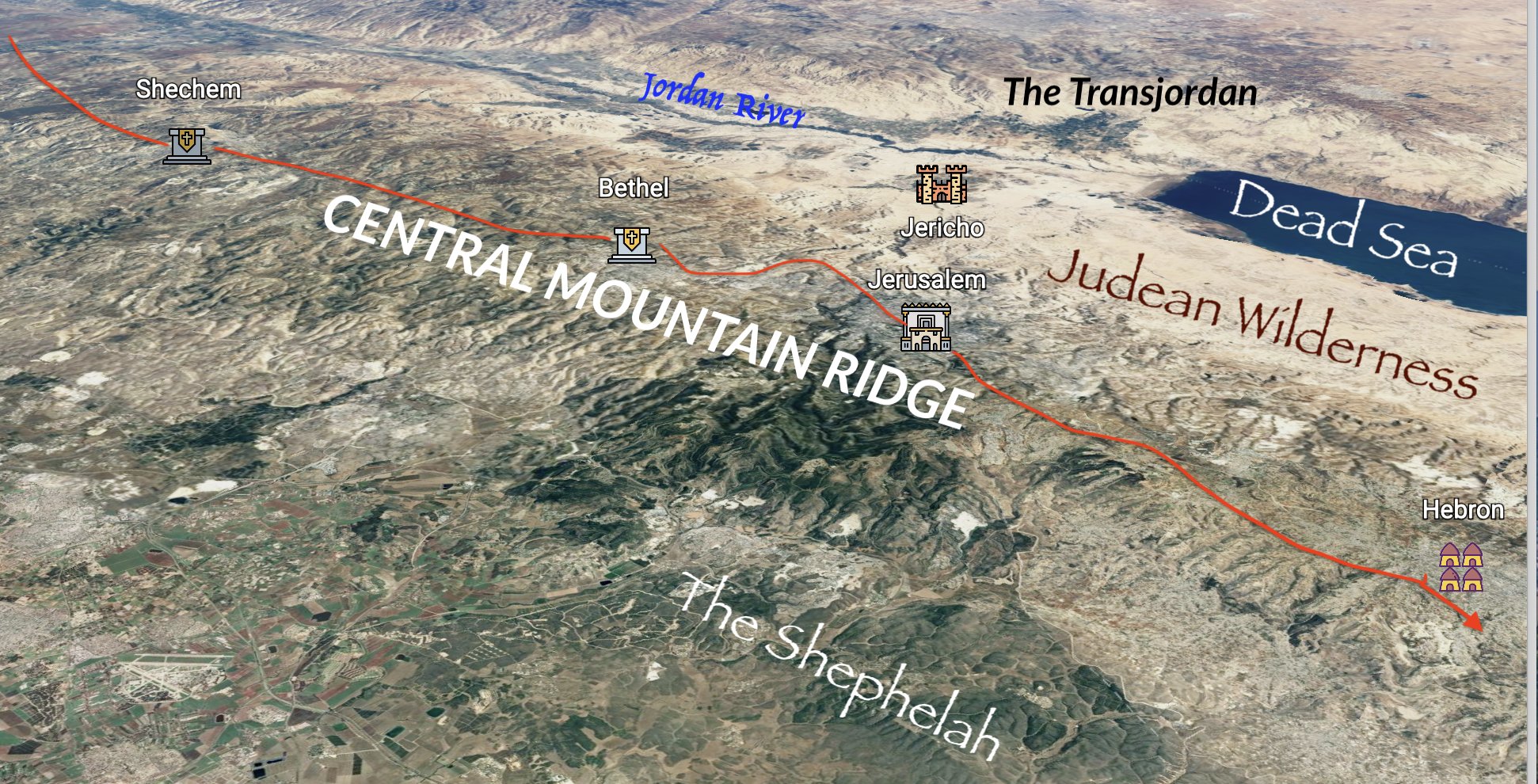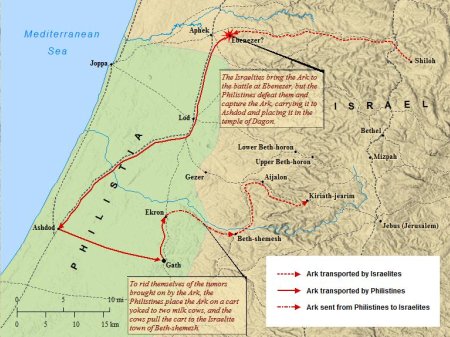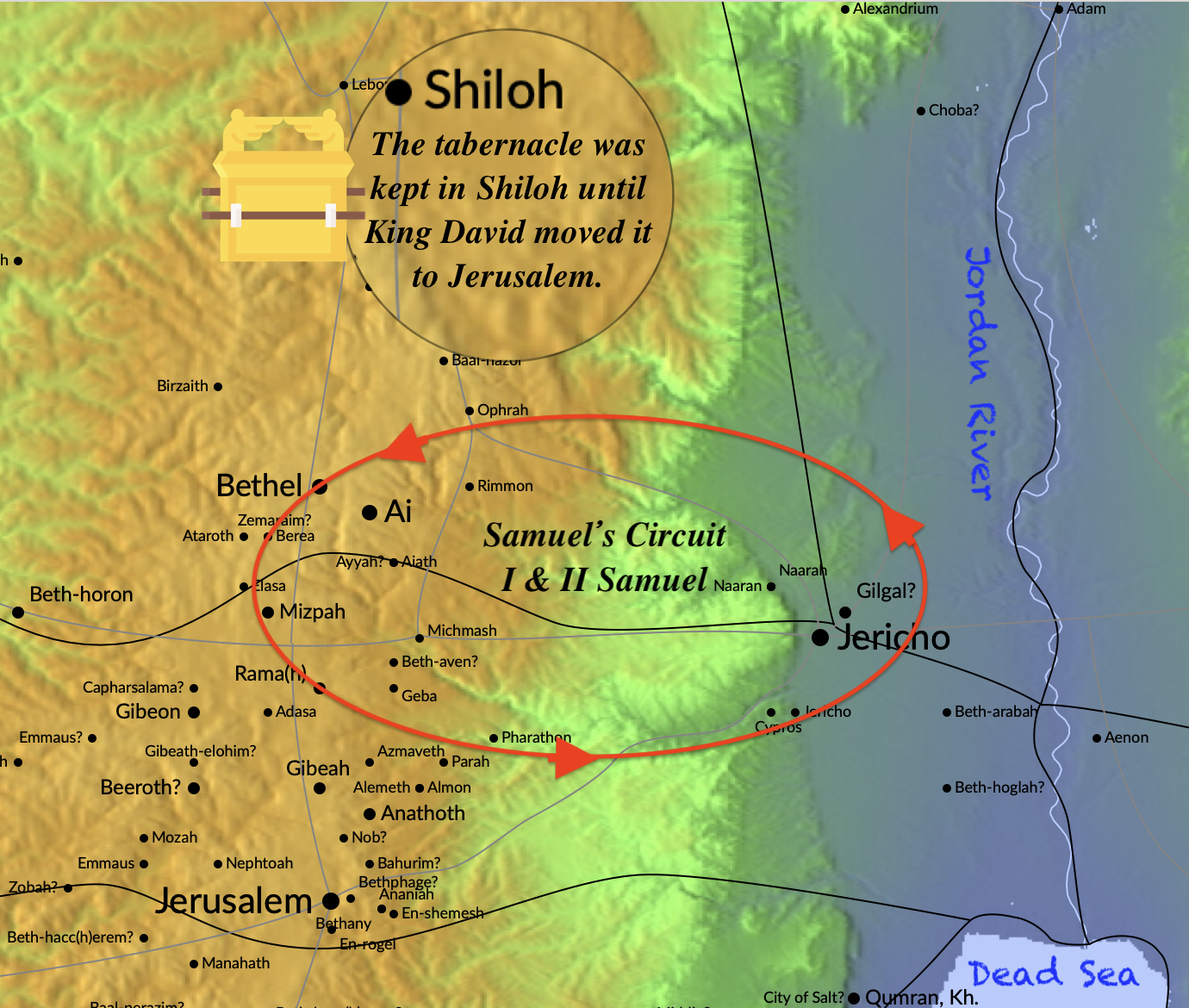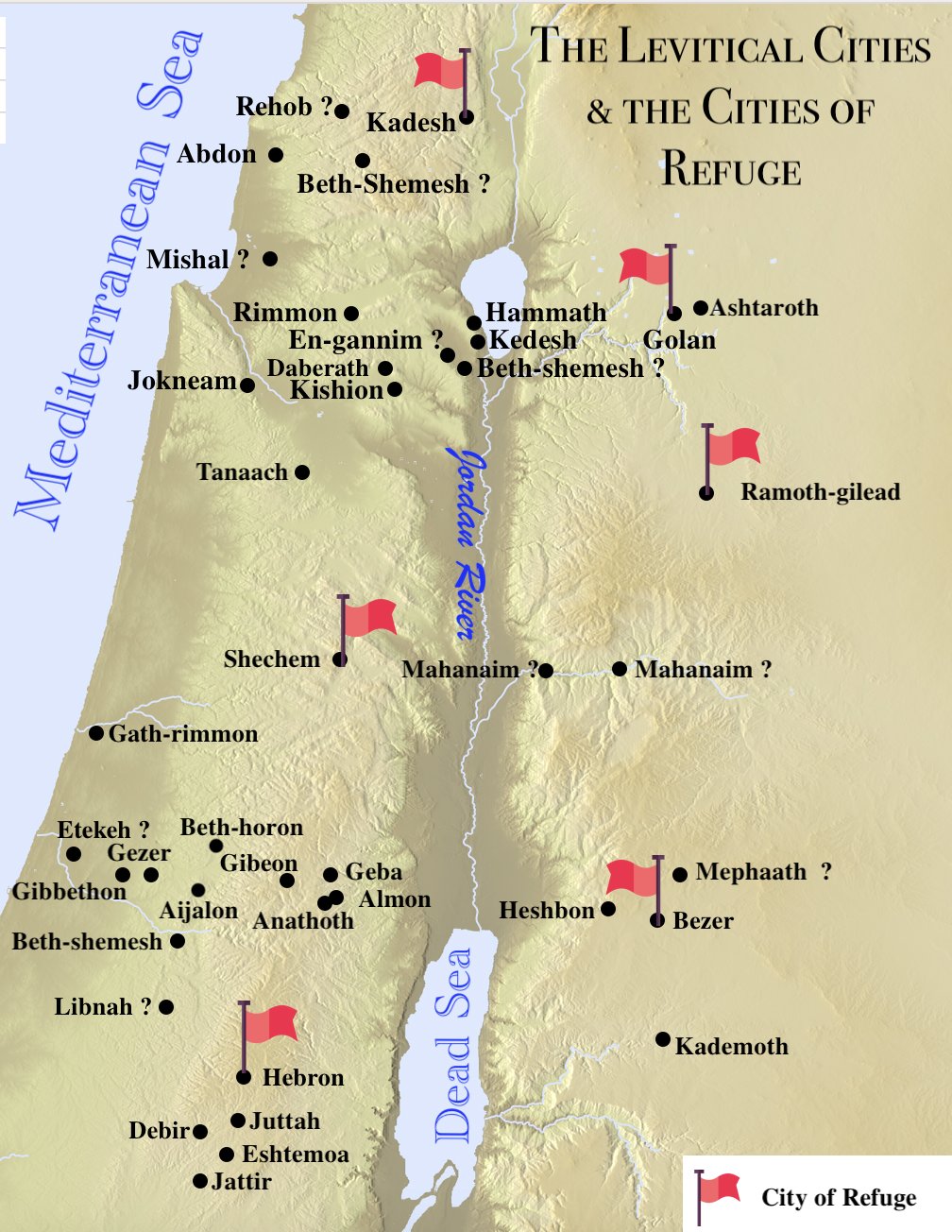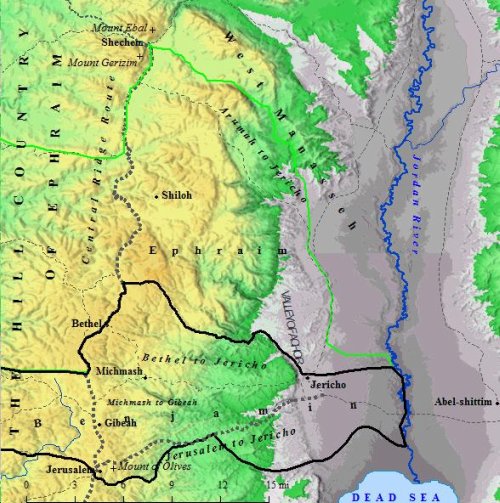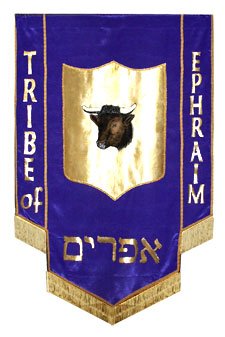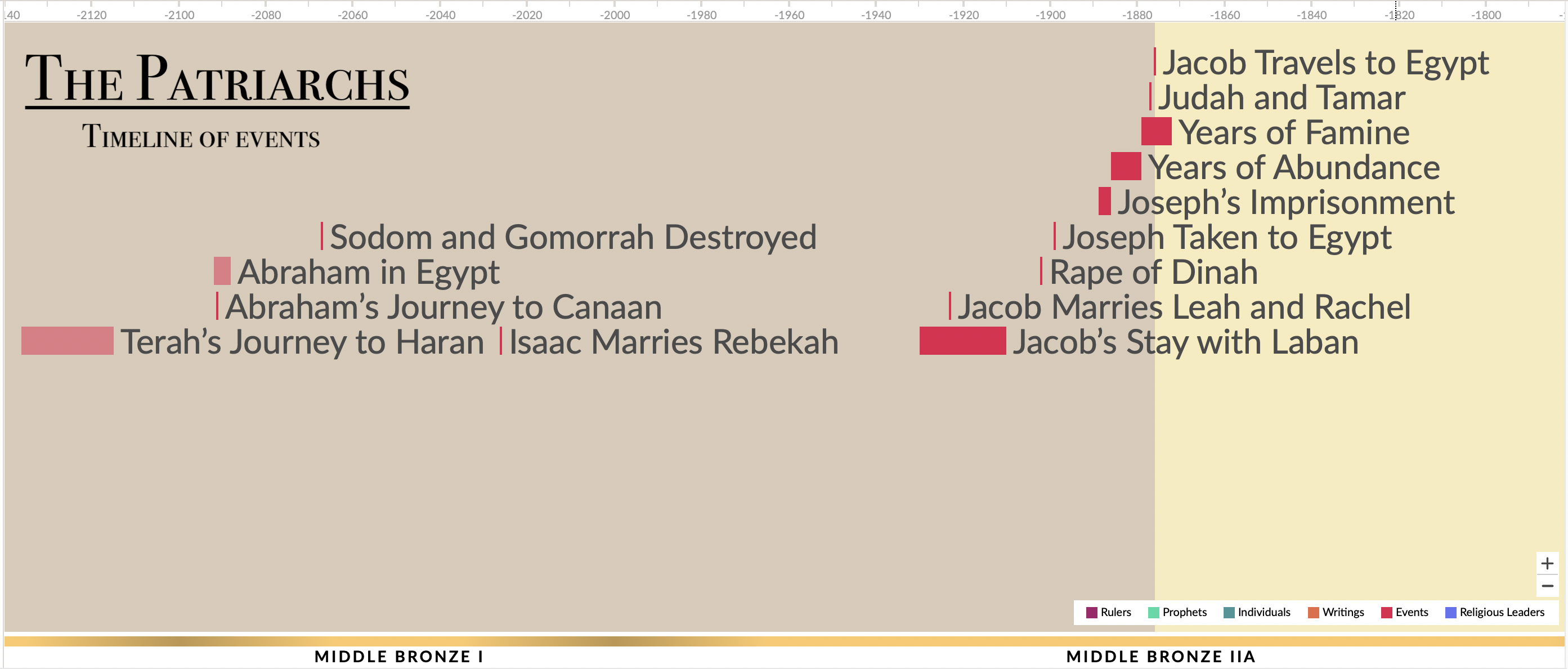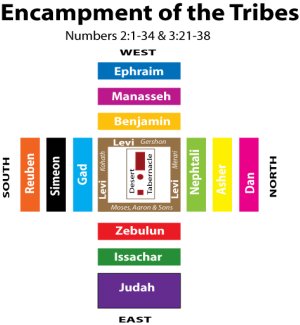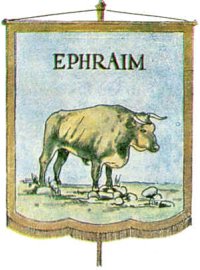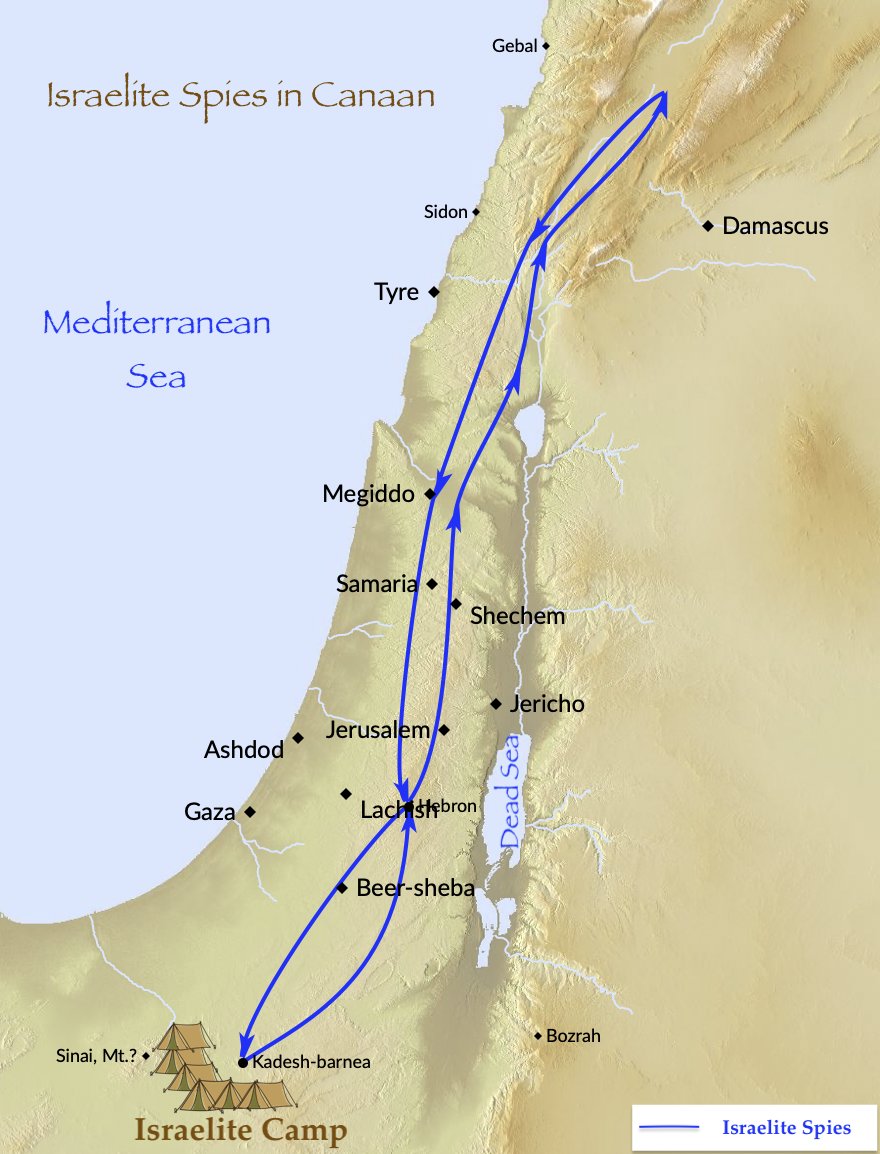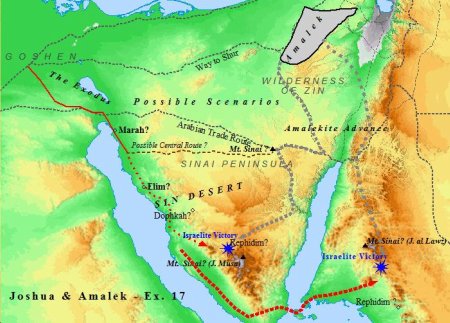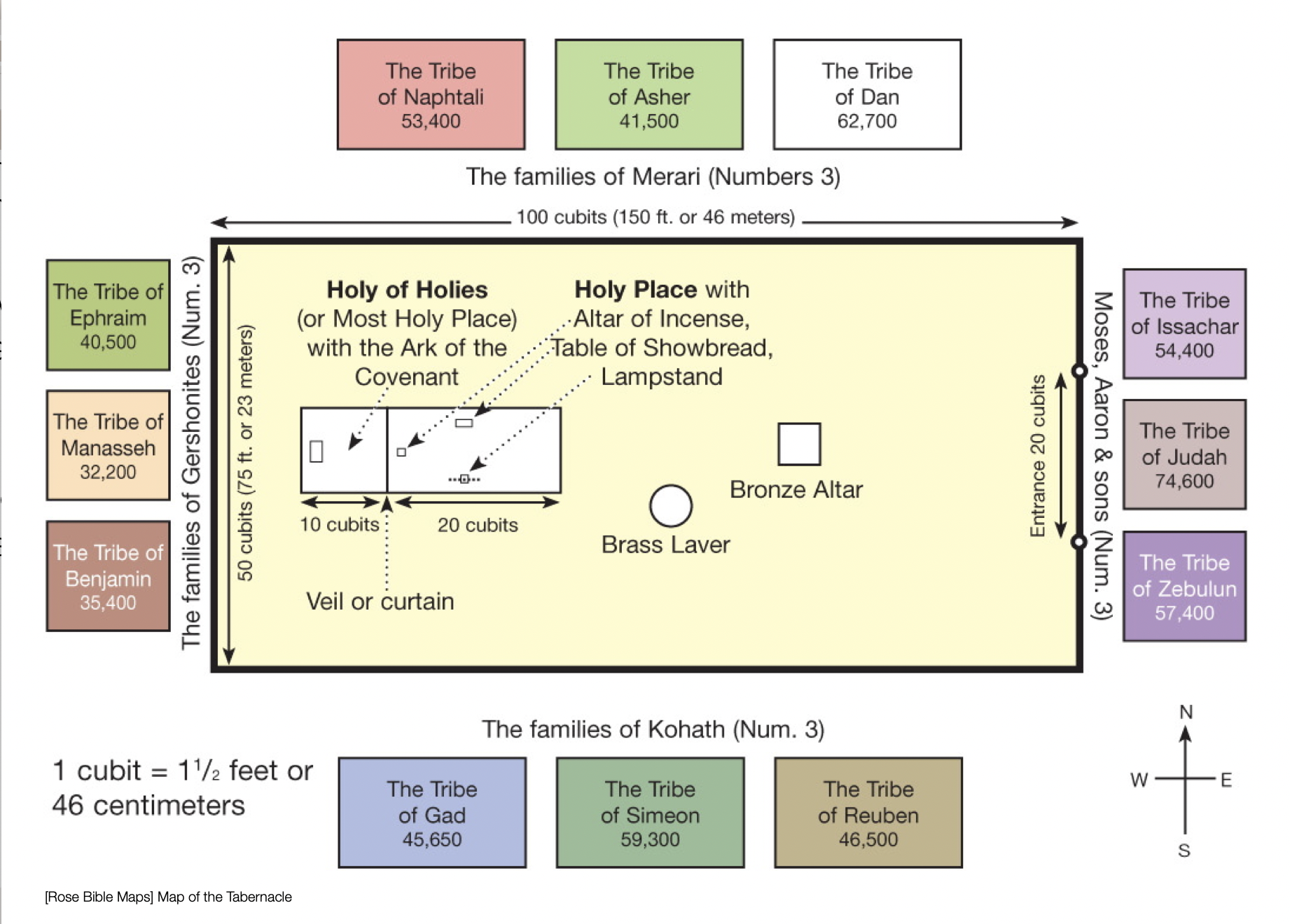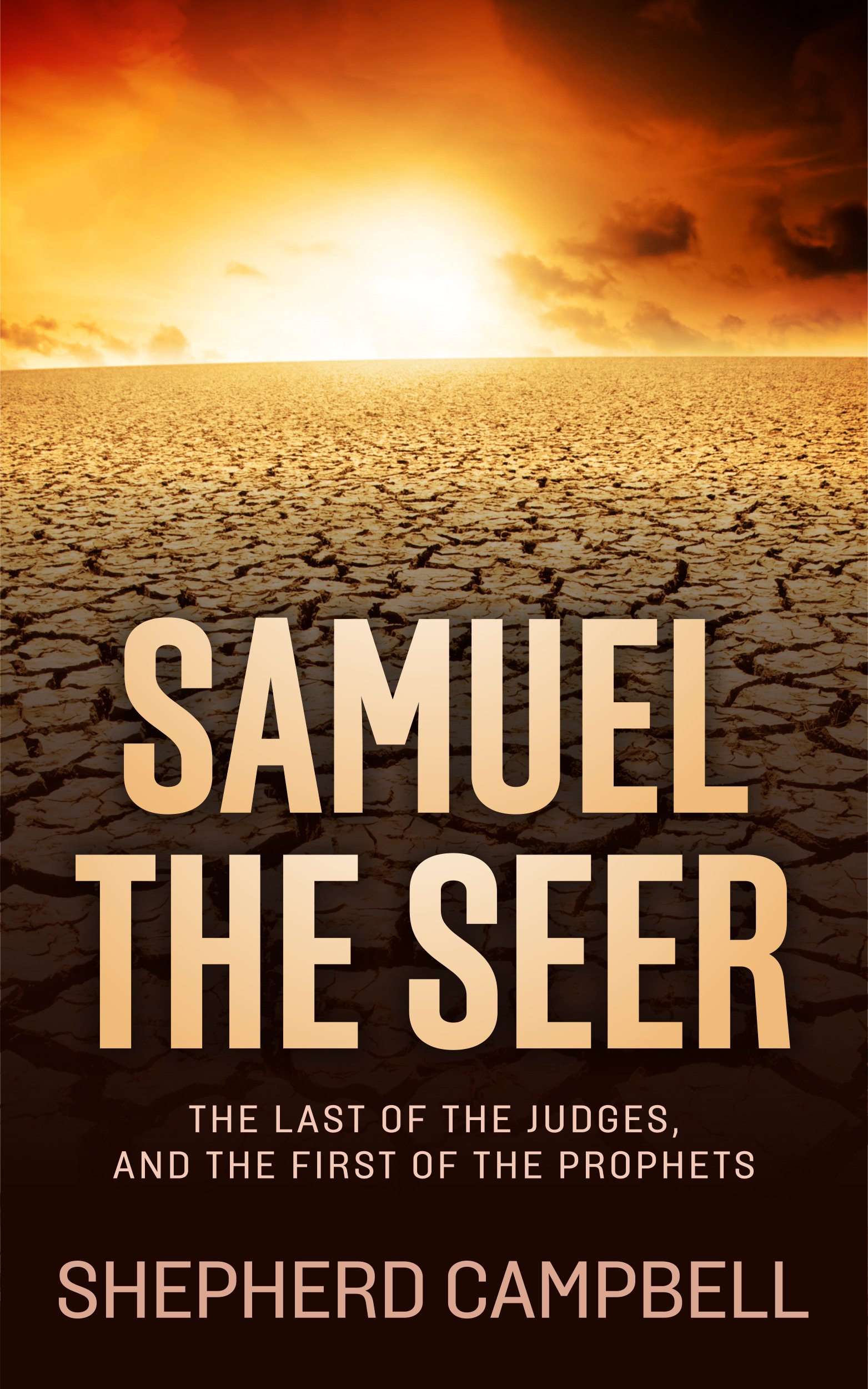VISIT OUR FACEBOOK PAGE!
The Tribe of Ephraim
The Blessings of the Tribe of Ephraim (part 1 of 2)
Jacob's Blessing - Gen. 48:19-20
"...However, his younger brother shall be greater than he, and his descendants shall become a multitude of nations. And he blessed them that day, saying, 'By you Israel shall pronounce blessing, saying, 'May God make you like Ephraim and Manasseh!' Thus he put Ephraim before Manasseh."
Moses Blessing - Deuteronomy 33:13-17
"And of Joseph he said, 'Blessed of the Lord be his land, With the choice things of heaven, with the dew, And from the deep lying beneath, And with the choice yield of the sun, And with the choice produce of the months. And with the best things of the ancient mountains, And with the choice things of the everlasting hills, And with the choice things of the earth and its fulness, And the favor of Him who dwelt in the bush. Let it come to the head of Joseph, And to the crown of the head of the one distinguished among his brothers. As the first-born of his ox, Majesty is his, and his horns are the horns of the wild ox; With them he shall push the peoples, All at once, to the ends of the earth. And those are the ten thousands of Ephraim, And those are the thousands of Manasseh."
The Tribe of Ephraim Page Contents
Click on a link below to visit that section of this page.
Battle with the AmalekitesThe Tribe of Ephraim Border Description
Of the 12 tribes of Israel, none symbolize the struggle between flesh and spirit more poignantly than the tribe of Epraim. At one moment rebuked, and the next praised, Ephraim was never far from God's watchful eye.
In fact, the Ephraimites seem to be at the center of many of Israel's most historical moments, drawing a mixture of both wrath and praise.
A prime reason for this was their tribal allotment. The pages of the Old Testament are saturated with the phrase, "hill country of Ephraim".
For it was in these hills Abraham first journeyed, Simeon and Levi
slaughtered the men of Shechem, Deborah and Gideon warded off heathen
armies, Saul and David fought the Philistines, and the northern kingdom
of Israel was first born.
The hill country of Ephraim played host to much of the Old Testament. The term would come to encompass much more than just the boundaries of the tribe of Ephraim. In fact, the name Ephraim came to represent much more than simply the tribe, but also the entire northern kingdom of Israel.
Oftentimes Israel and Ephraim are used interchangeably. The Biblical description of the boundaries of Ephraim can be found in Joshua 16.
The entire chapter is only ten verses long, and covers the lot of Ephraim and Manasseh, and the cities and boundary of the tribe of Ephraim.
One must make note than many times in Scripture the tribe of Ephraim is mentioned in conjunction with Joseph and Manasseh. Ephraim was the second and youngest son of Joseph, with Manasseh being the eldest.
However, their grandfather Jacob blessed Ephraim above Manasseh. Sometimes the Bible refers to both Ephraim and Manasseh jointly as the sons of Joseph, or house of Joseph, or simply Joseph.
Joshua 16 opens up in such a way. The first four verses list "the lot for the sons of Joseph" combined. Then Scripture proceeds to individually list the boundaries and cities of each tribe separately.
"Then the lot for the sons of Joseph went from the Jordan at Jericho to the waters of Jericho on the east into the wilderness, going up from Jericho through the hill country to Bethel. And it went from Bethel to Luz, and continued to the border of the Archites at Ataroth. And it went down westward to the territory of the Japhletites, as far as the territory of lower Beth-horon even to Gezer, and it ended at the sea. And the sons of Joseph, Manasseh and Ephraim, received their inheritance."
This stretch of land, approximately 55 miles in length and 30 miles in width, lay tucked within the Western Mountains of Palestine. These mountains ranged in height from 1,500 feet to 4,000 feet in altitude. This is comparable to the Ozark Mountain Range in the United States, located in southwestern Missouri and north Arkansas.
The Western Mountains run the length of Canaan, interrupted only by the Jezreel Valley. Some of this land was unfriendly to man, possessing deep, narrow gorges, and thorns and scrub for vegetation.
The Great Sea and the Jordan River were within easy reach of the tribe of Ephraim, opening it up to trade and commerce from both land and sea. Major roadways dissected the land, namely the Central Ridge Route, which ran from Beersheba in the south all the way through Shechem.
Hebron, Jerusalem, Bethel and Shechem lay on this road, as they do to this very day. The Central Ridge Route connected the north and the south, and Ephraim sat straddled in the middle.
The mountains provided protection, the plateau produced rich and fertile crops, and the lines of communication between north and south passed within its boundaries, thus the tribe of Ephraim came to be a major influence in the shaping of Israel's earliest periods. Ephraim also shared a border with Benjamin in the south, placing it within close proximity to Judah.
This proximity attributed to the jealousies and rivalries which developed between the seat of power in the south, Judah, and the original seat of power in the north, Ephraim. During the days of Solomon, the border between the tribe of Ephraim and the tribe of Benjamin was a peaceful one.
Benjamen took a favorable stance towards the tribe of Ephraim and vice versa. It was only during the days of the schism that the border became Ephraim and Judah, as Benjamin was absorbed into the southern kingdom.
At this point we see the conflict develop between Ephraim and Judah. It was this conflict which provided the spark for Ephraim's idolatry.
Ephraimite Cities
The remaining verses of chapter 16 deal specifically with the tribe of Ephraim and its borders and cities. These are given in verses five through ten.
"Now this was the territory of the sons of Ephraim according to their families: the border of their inheritance eastward was Ataroth-addar, as far as upper Beth-horon. Then the border went westward at Michmethath on the north, and the border turned about eastward to Taanath-shiloh, and continued beyond it to the east of Janoah. And it went down from Janoah to Ataroth and to Naarah, then reached Jericho and came out at the Jordan. From Tappuah the border continued westward to the brook of Kanah, and it ended at the sea. This is the inheritance of the tribe of the sons of Ephraim according to their families, together with the cities which were set apart for the sons of Ephraim in the midst of the inheritance of the sons of Manasseh, all the cities with their villages."
The first city mentioned as belonging to the tribe of Ephraim is Ataroth-addar. This city sat on the border of Ephraim and Benjamin. The border between Ephraim and Benjamin is vague as to which town and area belongs to which tribe. Joshua 18:11-28 lists the cities of Luz, Bethel, Ataroth-addar and Beth-horon as belonging to Benjamin. This conflicts with the list given for the tribe of Ephraim. Indeed the border seems to split many towns in half.
Nadav Na'aman argued the list of Benjamin was derived from a larger, earlier list which comprised the towns and borders of the kingdom of Judah. This would have included both Judah and Benjamin. The list predated the book of Joshua. Thus originally, Benjamin was listed with the tribe of Judah.
UPON ENTERING CANAAN, THE TABERNACLE WAS KEPT IN SHILOH. THUS EPHRAIM WAS HOME TO THE FIRST TABERNACLE IN CANAAN. BETHEL & GILGAL WERE ALSO IMPORTANT CITIES WITHIN THE HISTORY OF ANCIENT ISRAEL. THEY WERE MILITARY AND RELIGIOUS CENTERS OF WORSHIP & ASSEMBLY. THE MOST IMPORTANT CITY WITHIN EPHRAIM WAS SHECHEM. SHECHEM PLAYED AN INTEGRAL & CENTRAL ROLE IN SHAPING THE HISTORY OF ISRAEL.
In essence, the Biblical authors, Na'aman argues, worked from an
original list when comprising these border descriptions and city lists
in Joshua. At the time of the composition of Joshua, the tribes of Israel were governed by tribal regime.
The tribe of Ephraim was responsible for the well being of the Ephraimites, and so it was with the other tribes as well. The author had to include the tribe of Benjamin in his new list.
The author, thus, was responsible for taking the original list of the kingdom of Judah and dividing it between the tribes of Judah and Benjamin.
Na'aman further states the Biblical author "does not correct 'reality' by concealing the encroachment upon its (Ephraim) territory by the northern towns of Benjamin".
In other words, the southern border and cities within the tribe of Ephraim were assigned, erroneously but intentionally, to the tribe of Benjamin, hence the apparent conflict with the two descriptions. One may ask why this was does intentionally, to which Na'aman argued the author was pro-Judah in sentiment.
Na'aman also points out this is further evidence of the tribal rivalry which existed between the tribe of Ephraim in the north and the tribe of Judah in the south. This tribal rivalry manifested itself more clearly in the rivalry between the kingdoms of Judah and Israel/Ephraim.
Whether this proved to be the case or not, it is evident that such vagaries with borders and cities were the norm throughout the Old Testament. The nature of society was fluid, ever changing, constantly shifting.
Power switched hands frequently, policies changed, and wars waged regularly. People were displaced, uprooted, moved and migrated. Boundaries were certain to become hazy and blurred by such occurrences and instability.
Beth-horon is also an interesting city within the tribe of Ephraim. Beth-horon was divided into two distinct parts, upper and lower Beth-horon. Upper Beth-horon rested on the slopes of the Western Mountains, with Lower Beth-horon on the flat plain below.
An interesting insight is given concerning Beth-horon in I Chronicles 7:24. This particular passage in the Bible lists Ephraim's descendants.
In verse twenty-three we are told of Beriah, a son of Ephraim. Beriah was born to Ephraim after the death of two of Ephraim's sons; consequence of a cattle raid gone awry. Beriah is said to have had a daughter, Sheerah.
It is Sheerah the Bible attributes the building of Beth-horon to. This is quite remarkable, seeing how Sheerah is a woman. Women in antiquity were second-class citizens. They had little power and less say in daily affairs. They certainly were not given the task of building cities.
However, this woman Sheerah must have been a remarkable and unique woman. The Bible credits Lower and Upper Beth-horon to her handiwork, as well as a third city, Uzzen-sheerah.
Despite the role and limitations of women in many ancient cultures, Sheerah seemed to have risen above those limitations. The Bible is silent as to the nature and life of Sheerah outside of her city building efforts.
We are left to wonder at how a woman could ascend to such a position and build three cities. This does reflect positively on the tribe of Ephraim, however. Perhaps the tribe was more open minded to such instances.
There is no doubt she must have been a unique, strong, and solid woman, afraid of no man, and willing to put herself on the line.
The most important and famous cities within the tribe of Ephraim were Shechem and Shiloh. Though the Bible lists Shechem within the boundaries of Manasseh, many scholars say it was absorbed by the stronger Ephraim. The two tribes, as stated above, are often mentioned together.
A city on the border would be regarded as a city of both tribes to a degree. Regardless, these two cities were at the center of Israel's earliest political and religious development.
The Ancient City of Shechem
Shechem was the first city encountered by Abraham upon his entrance into Canaan. Abraham descended into the Jordan River Valley via the Jabbok River. As Abraham and Lot encountered the Jordan, the Wadi Farah would have led them northward into the hill country of Ephraim.
From this route, Shechem would have been one of the first cities one encountered in the mountains.
Abraham stopped at Shechem. It was there that Abraham, still Abram at the time, built an altar to God, thus establishing the sacredness of the site for the remainder of the history of mankind.
Shechem was central to the Abrahamaic Covenant from the earliest call of God to this great man of faith. It was thus equally important to the tribe of Ephraim, and no doubt created a sense of pride to have such a sacred city in the midst of their allotment.
In Shechem God promised Abraham He would give the land to him and his descendants. The men of the tribe of Ephraim were attempting to fulfill this prophecy during the Conquest. Shechem was a reminder of God's promise to Abraham.The city rested at the base of Mount Gerizim, with Mt. Ebal nearby as well. The 12 tribes of Israel stood upon these mountains shouting blessings and curses earlier during Joshua's reign.
The Central Ridge Route passed directly through Shechem. East and West routes are also located nearby, thus making it important in trade and communication.
Archaeological artifacts from ancient Mesopotamia with Akkadian motifs have been found in the area. The city had been in existence since before Abraham, whom is dated to around 2000 B.C.
Walls were eventually built, but the city was destroyed in the sixteenth century. However, it is mentioned in the Amarna Letters from the fourteenth century under the guidance of a man named Labaya. Labaya vacillated between loyalty and agitation with Egypt, eventually succumbing to a violent death.
The city was also influential during the time of the conquest and settlement. Joshua 20:7 lists Shechem as one of the six cities of refuge. These cities were designated in various parts of the tribal confederacy.
Shechem was designated as such a city likely because of it's significance, and it's location in the hill country of Ephraim.
The cities of refuge were interesting facets of ancient Jewish law. These were cities which an individual guilty of accidental murder could flee and await trial. Once inside the walls of the city of refuge, the accused was free from blood vengeance sought by any relative of the victim.
He would remain in the city until a trial, at which point he would stand "trial before the assembly". If found innocent of premeditated murder, he would be free to live in that city of refuge until the death of the High Priest. The individual in question was free from revenge by an embittered relative within the walls.
God made it clear, however, that if caught outside the walls, he was no longer protected by the city of refuge. In such cases, the individual in question would be vulnerable to blood vengeance, with no guilt being assigned to the blood avenger. Upon the death of the High Priest, he or she was allowed to return to their previous home and way of life, free from guilt, and having served their sacrificial time for accidental bloodshed.
This was an important point the Lord made to Moses. God did not wish war and bloodshed upon the land. He wished for peace and prosperity. This is made plain by God in Numbers 35:33-34.
"Do not pollute the land where your are. Bloodshed pollutes the land, and atonement cannot be made for the land on which blood has been shed, except by the blood of the one who shed it. Do not defile the land where you live and where I dwell, for I, the Lord, dwell among the Israelites."
Shechem, thus, took on extra significance within the tribe of Ephraim. It was a unique city with a unique history, one deeply connected with the law and promises of God Almighty.
The Holy City of Shiloh
The second city of similar such importance was Shiloh. Author and scholar Jon Bright stated that Shiloh was the "amphictyonic center after the conquest". This meant Shiloh was the central religious center of Israelite life. Joshua 18 gives an insightful glimpse into the importance of Shiloh.
"Then the whole congregation of the sons of Israel assembled themselves at Shiloh, and set up the tent of meeting there; and the land was subdued before them."
It was at this point that Joshua made the third division of land. The northern campaign had just ended with the victory at the Waters of Merom.
Primarily the northern tribes were allotted territory; Naphtali, Asher, Issachar and Zebulun. However, the tribes of Simeon, Dan and Benjamin, left out of the second division, were included as well. The tribe of Ephraim had received their allotment at Gilgal, the second such division.
Judges 18:31 mentions Shiloh in connection with the House of God residing at Shiloh. Another important reference is found in I Samuel 1:3. This is made in relation to the story of the great prophet Samuel's birth.
"Now this man would go up from his city yearly to worship and to sacrifice to the Lord of hosts in Shiloh. And the two sons of Eli, Hophni and Phinehas were priests to the Lord there."
It was here Samuel's mother promised her child to God if only He would allow her to conceive. Samuel was God's answer.
Shiloh was centrally located within the tribe of Ephraim, in the heart of the hill country of Ephraim. Many scholars believe the center of worship came to Shiloh from Bethel. It had come to Bethel from Shechem, the first amphictynomic center of Israel.
It is also important to keep in mind that the 12 tribes of Israel had
yet to declare itself a monarchy. They remained a loose confederation
of tribes, whose common God was the primary bond.
Judges 21:12 also places "the camp at Shiloh, which is in the land of Canaan." The tribe of Ephraim, thus, had within its sphere of influence two of the oldest, and politically and spiritually most important cities in ancient Israel.
This brought a degree of political clout, and Ephraim took full advantage. As will be seen, the tribe of Ephraim was instrumental in the political upheaval which led to the Divided Monarchy.
Gezer
Joshua 16:10 describes the lone Canaanite stronghold within the tribe of Ephraim. That city is listed as Gezer.
"But they did not drive out the Canaanites who lived in Gezer, so the Canaanites live in the midst of Ephraim to this day, and they became forced laborers."
Gezer was located in the southernmost regions of the tribe of Ephraim. Michael Grant, in his book The History of Ancient Israel, called Gezer "one of the few bastions the hill country of Eprhaim throws out towards the west".
It is thus easy, in this context, to understand why the Canaanites would establish such a strong presence in the city. Interestingly, the city is also listed as one of the Levitical cities within the tribe of Ephraim.
Grant states the town did not lie at high elevation, yet commanded a view of the area in all directions. It sat at the junction of two important trade routes from antiquity. Gezer was well-watered and very fertile. It has shown occupation dating from before 3000 B.C. The Canaanite city was twenty-seven acres in size. A wall thirteen feet thick has been discovered. This wall was destroyed, and an even larger wall was rebuilt in its place.
Verse nine speaks of cities which were shared between the tribe of Ephraim and its brother-neighbor to the north, Manasseh. It reads;
"..together with the cities which were set apart for the sons of Ephraim in the midst of the inheritance of the sons of Manasseh, all the cities with their villages."
Further information is given in Joshua 17:8-18. This passage lists the cities and borders of Manasseh. Verses eight and nine shed a valuable light on the relationship between the two tribes.
"The land of Tappuah belonged to Manasseh, but Tappuah on the border of Manasseh belonged to the sons of Ephraim. And the border went down to the brook of Kanah, southward of the brook (these cities belonged to Ephraim among the cities of Manasseh)..."
It would seem these two tribes peacefully shared territory within their tribal allotments. Their borders were shared as well.
"The south side belonged to Ephraim and the north side to Manasseh, and the sea was their border; and they reached to Asher on the north and to Issachar on the east."
Thus they maintained close border ties. Though other tribes shared borders as well, these two tribes are singled out in their descriptions.
It is no coincidence the two tribes are mentioned frequently together in Scripture. In this instance, it is in conjunction with their borders. The brotherly bond had not dissipated over time between the tribe of Ephraim and Manasseh.
Other notable cities include the city of Ephraim in John 11:54. The exact location of this city is a subject of debate. Some scholars associate it with Ophar, others with Ephron.
II Chronicles 13:19 refers to the city as Ephron. Regardless, its significance can be found in the fact that Jesus Christ retired there in John, seeking to escape the crowds and pressures of Jerusalem.
"Jesus therefore no longer continued to walk publicly among the Jews, but went away from there to the country near the wilderness, into a city called Ephraim; and there He stayed with the disciples."
One wonders what miracles He wrought in these hills, and the wisdom imparted to His disciples at this remote mountain enclave.
The Tribe of Ephraim
Levitical Cities
The tribe of Levi became known as the Priestly tribe. They were set apart for God, and ordained by God to not receive a portion of the inheritance. Jacob, however, allotted two portions to Joseph, one for each of his son.
Jacob blessed the tribe of Ephraim into the twelve tribes of Israel. Levi, however, was the portion reserved for God. Instead, God gave them cities from each of the other twelve tribes to dwell and live in. Each city also contained all of the pasture lands associated with that city.
The Levitical cities within the tribe of Ephraim can be found in Joshua 21:20-22.
"Then the cities from the tribe of Ephraim were allotted to
the families of the sons of Kohath, the Levites, even to the rest of
the sons of Kohath. And they gave them Shechem, the city of refuge for
the manslayer, with its pasture lands, in the hill country of Ephraim,
and Gezer with its pasturelands, and Kibzaim with its pasture lands and
Beth-horon with its pasture lands; four cities."
Shechem was a city of refuge as well as a Levitical city. There were only five other of such towns throughout all of Israel. It is interesting to note the Bible tells us the Ephraimites failed to drive out the Canaanites from Gezer.
Yet, Gezer here is a Levitical city. Scripture does record the Canaanites of Gezer were subjected to forced labor. This may have included working the fields and pastures of the Levites, though such notions are pure speculation.
The sons of Kohath received ten cities in all from the tribes of Ephraim, Dan and Manasseh. Four of these cities belonged to the tribe of Ephraim.
The Hill Country of Ephraim
The hill country of Ephraim, also known as Samaria, starts with the Gilboan Mountains. These mountains are approximately 1,600 feet in height. Near Bethel, the mountains rise more than 3,300 feet. The northern part of the hill country of Ephraim belongs to Manasseh.
Soft sedimentary rock make up these mountains, with Wadis criss-crossing the land. A Wadi is a gullie created by runoff erosion over thousands of years. The Wadi Farah was used by Abraham to crossover into Canaan, near Shechem.
In the south rests the tribe of Ephraim. Here, a harder limestone resisted such erosion and formed an isolated plateau, 3,000 feet high with steep slopes on both sides.
The plateau stretched from Shechem to Bethel. It was upon this plateau the tribe of Ephraim thrived. The Central Ridge Road ran along this plateau, connecting Shiloh, Bethel, and Mizpah.
The soil here was very rich, and the Ephraimites took advantage of this, producing abundant and ample crops. These people farmed the valleys and built terraces on the hillsides. Ample supplies of wheat, barley and olives were produced in the hill country of Ephraim. The tribe of Ephraim sat atop a fertile plateau, steeply sloped and protected on each side. Its allotment was well defended by nature. The area was also known for its vineyards and orchards.
Archaeology has shown an increase in settlement in the hill country corresponding to the Old Testament narrative. Many scholars feel this is indicative of an Israelite invasion into Canaan, a theory which is controversial at best amongst the world of academia. One strong indication of Jewish settlement is the lack of pig bones from the hill country sites.
The tribe of Ephraim occupied some of the most famous land in all of the Old Testament. Moses Blessing of Joseph in Deuteronomy 33:13-17 speaks of the tribe of Ephraim's land. Again, Ephraim and Manasseh are mentioned together, and included in the blessing of Joseph.
"And of Joseph he said, 'Blessed of the Lord be his land, with the choice things of heaven, with the dew, and from the deep lying beneath, and with the choice yield of the sun, and with the choice produce of the months. And with the best things of the ancient mountains, and with the choice things of the everlasting hills, and with the choice things of the earth and its fullness, and the favor of Him who dwelt in the bush."
Moses foresaw the prosperous and fertile land the sons of Joseph would one day inherit. Indeed their land was rich and the ancient mountains produced an abundance of food. The terraced hillsides proved productive as well. Ephraim was blessed, both with protection and production from its inheritance.
Joshua is said by Scripture to have lived and died in the hill country of Ephraim. He was from the tribe of Ephraim, a direct descendant from the line of Ephraim himself.
After he had finished apportioning the land to the 12 tribes of Israel, "the sons of Israel gave an inheritance in their midst to Joshua the sons of Nun". Joshua's portion is given in Joshua 19:50.
"In accordance with the command of the Lord they gave him the city for which he asked, Timnath-serah in the hill country of Ephraim. So he built the city and settled in it."
Not only did Joshua build and settle in this city, but he died and was buried there as well. This is recorded in chapter 24 verse 30.
"And they buried him in the territory of his inheritance in Timnath-serah, which is in the hill country of Ephraim, on the north of Mount Gaash."
Joshua died, traditionally, at the age of 110. He was born of the tribe of Ephraim during the desert wandering, had represented the tribe as a spy into Canaan, and led the Israelites into Canaan.
He is one of the great men of Israel's glorious past. He was a servant of God, successor to Moses, part-conqueror of the Promised Land; and yet very little is said of his death.
Ephraim - The 2nd Son of Joseph
The birth of Ephraim is found in Genesis 41:50-52. Ephraim was the second born son to Joseph. His older brother's name was Manasseh. Their mother was an Egyptian named Asenath. She was the daughter of an Egyptian priest of On.
This is a fascinating combination of cultures and religions. Joseph stayed true to his father's God. However, it is certain he had engaging conversations with the priests of Egypt about their gods and his God. God Almighty had been made known to them through the life of Joseph, thus they had great respect for the man and his beliefs.
"Now before the year of famine came, two sons were born to Joseph, whom Asenath, the daughter of Potiphera priest of On, bore to him. And Joseph named the first-born Manasseh, 'For,' he said, 'God has made me forget all my trouble and all my father's household.' And he named the second Ephraim, 'For,' he said, 'God has made me fruitful in the land of my affliction."
Thus Ephraim was born to Joseph in Egypt, during the seventh of seven years of plenty. The great famine would set in the next year, which ultimately lead Joseph back to his father Jacob. Ephraim was the second son, thus he was not in line to receive the greater blessing. That honor would go to the first born son, Manasseh. Manasseh would be the son to carry on the family name. Joseph would have shined when looking at this lad, knowing he, the firstborn, would carry the torch. At this point in time, Joseph would have had no idea the tribe of Ephraim would take on the greater significance.
Genesis 46 lists the family of Jacob and those which entered Egypt with him. Joseph's family is also restated in verse 20. The next reference to Ephraim is in connection with Jacob/Israel in Genesis 48:5.
"And now your two sons, who were born to you in the land of Egypt before I came to you in Egypt, are mine; Ephraim and Manasseh shall be mine, as Reuben and Simeon are."
This is an interesting passage. One notices the mention of Simeon
and Reuben at the close of the verse. Simeon brought great shame to
his father when he, and his brother Levi, slaughtered the men of Shechem
for the rape of their sister Dinah in Genesis 34. In Genesis 35
Reuben, likewise, was stripped of his birthright by Jacob for sleeping
with Bilhah, one of his father's concubines. This act brought great
shame to Jacob as well.
Jacob's blessing of Ephraim and Manasseh seems to represent a transference of sorts from the two wayward sons of Israel, to the two righteous grandsons of Jacob. Each of the four, however, received a portion, thus bringing the total number of tribes in Israel to thirteen.
Levi, however, was excluded from an inheritance, thus the number twelve was preserved with the entrance of Ephraim and Manasseh.
Scripture supports such a scenario in I Chronicles 5:1.
"Now the sons of Reuben the firstborn of Israel (for he was the firstborn), but because he defiled his father's bed, his birthright was given to the sons of Joseph the son of Israel; so that he is not enrolled in the genealogy according to his birthright."
This would seemingly have created a rift between Reuben and Israel, though the Bible does not state so. Human nature would indicate such would have been the case, however.
Regardless, Reuben's transgression was not taken lightly by his father Jacob. It was looked upon so severe that he was stripped of his birthright.
Nine verses later Joseph takes his two sons to see their grandfather Jacob. By this time in the narrative, Israel is approaching his last days.
In fact, the title of chapter 48 in the New American Standard Bible is, "Israel's Last Days". Genesis 49 is the blessing of each of his twelve sons, followed in chapter fifty by his death. Thus, Ephraim had spent some time with his grandfather, likely, in the days leading up to this blessing.
This is why the opening verse of the narrative, verse 8, is surprising in that it pictures Jacob confused as to the identity of Joseph's sons. It had only been three verses earlier which he had pronounced them as his own, implying their favored position over his own sons Reuben and Simeon. The Biblical narrative seems to be inconsistent here.
"When Israel saw Joseph's sons, he said, "Who are these?"
Two explanations have been offered to explain this. One is found in the next verse.
"Now the eyes of Israel were so dim from age that he could not see. Then Joseph brought them close to him, and he kissed them and embraced them."
The seemingly obvious explanation for verse nine is Israel simply could not see his grandchildren, and did not recognize their shapes and figures from a distance.
Rabbinical literature has another explanation. It is believed that Jacob tutored Ephraim for seventeen years before this episode took place.
Jacob, being in the prophetic spirit at the moment, looked upon Ephraim and saw Jeroboam and Ahab. These two descendants of Ephraim would commit heinous acts of idolatry, and lead Israel astray. Thus the prophetic spirit left him.
However, upon a supplication to God, Jacob's eyes were reopened, and he saw Joshua, son of Nun. It was at this point, upon seeing Joshua, that Jacob gave Ephraim precedence over Manasseh.
The Biblical passage is found in verses thirteen through twenty-two. In verse thirteen Joseph brings his sons before their grandfather Israel.
"And Joseph took them both, Ephraim with his right hand toward Israel's left, and Manasseh with his left hand toward Israel's right, and brought them close to him."
The story is always found in the details. Scripture paints a beautifully vivid picture of Joseph leading his sons up to their grandfather Jacob. In verse eleven, Israel had looked at his son Joseph and said;
"I never expected to see your face, and behold, God has let me see your children as well."
What a heartfelt moment this must have been for Joseph and Jacob. Israel had not thought he would see his favorite and beloved son Joseph again, but God had not only produced Joseph, but two grandsons as well. Israel surely thanked God from the bottom of his heart as he embraced his two grandchildren.
In verse fourteen, Israel gazed upon his grandchildren, seated in the order which they were supposed to receive the blessing. The favored, Manasseh the older brother, sat at the right hand of Jacob.
The right hand was the hand which would deliver the blessing. It was the honored seat at the table, or at the banquet. It was an honored position to be sitting at the right hand. Jesus Christ sits at the right hand of God in heaven.
Thus, it was believed by Joseph his oldest son Manasseh would sit at the right hand of Jacob, and receive the honored blessing of such a position. This, however, was not to be.
"But Israel stretched out his right hand and laid it on the head of Ephraim, who was the younger, and his left hand on Manasseh's head, crossing his hands, although Manasseh was the first-born."
Scripture says Joseph was "displeased". He thought his father must surely have made a mistake, been confused as he was near death and unable to see clearly. Joseph reacted quickly to correct Israel in verse seventeen. He "grasped his father's hand to remove it from Ephraim's head".
Jacob, however;
"refused and said; 'I know, my son, I know; he shall also become a people and he also shall be great. However, his younger brother shall be greater than he, and his descendants shall become a multitude of nations."
Jacob saw certain elements of Ephraim's fate. It is certain God divinely guided his hands, knowing Ephraim would play a prominent, though at times dubious, role. Ephraim would live a fruitful life after this event.
Genesis 50 records the death of Joseph. Scripture tells Joseph had seen the third generation Of Ephraim's sons. Scripture also states in the same verse the sons of Machir, the son of Manasseh, were born "on Joseph's knees".
A passage from Numbers 26 lists the family of Ephraim to the third generation through Shuthelah. Verses thirty-five through thirty-seven list the men and numbers of the tribe of Ephraim.
"These are the sons of Ephraim according to their families: of Shuthelah, the family of the Shuthelites; of Becher, The family of the Becherites; of Tahan, the family of the Tahanites. And these are the sons of Shuthelah: of Eran, the family of the Eranites. These are the families of the sons of Ephraim according to those who were numbered of them, 32, 500. These are the sons of Joseph according to their families."
Becher is also called Bered in I Chronicles. This verse gives full detail concerning the family of Ephraim. Ephraim's sons are listed in verse 20.
"And the sons of Ephraim were Shuthelah and Bered his son, Tahath, his son, Eleadah his son, Tahath his son,"
Verse twenty-one records an interesting encounter between some of the sons of Ephrarim; Zabad, Shuthelah, Ezer and Elead. Scripture records these sons of Ephraim engaged the local Canaanite population in a conflict.
They went down to steal cattle from the men of Gath. However, whatever the circumstances were, the men of Gath were ready and killed Ephraim's sons instead.
Verse twenty-two records Ephraim's reaction.
"And their father Ephraim mourned many days, and his relatives came to comfort him."
Scripture next records the birth of his son Beriah. It is Beriah who gives birth to the remarkable woman Sheerah mentioned above. Thus, Sheerah was the granddaughter of Ephraim, the son of Jacob. From this lineage, verse twenty-seven concludes Ephraim's descendants.
"Non his son, and Joshua his son."
Joshua's lineage is traced all the way back to Ephraim. It was upon these mighty roots the tribe of Ephraim would ascend to the forefront of Israel's history.
The ancient Midrash known as the book of Jasher states Ephraim miscalculated the time of departure. They left Egypt thirty years too early. As a result of their disobedience, they were met by a hostile army of Philistines.
Thirty thousand Ephraimite troops engaged twenty thousand Philistines near Gath. All but ten of the Ephraimite men were slain. These ten escaped, fled back to Egypt, and informed Ephraim of what had transpired. Ephraim wept and mourned for many days. The route of the Exodus, according to the legend, was in order to lead the Israelites around and away from the scattered bones of the dead and strewn Ephraimite army.
Encampment of the Tribe of Ephraim
The Biblical text leaves little question as to the detail God took with His people. Though they left Egypt in haste, God quickly organized them into a cohesive unit. At its earliest stage, however, Moses had his hands full governing the people of Israel.
However, by listening to God, and obeying His instructions, the Israelites evolved into one functioning body. Part of their discipline was in the way they set and pitch camp around the Tabernacle.
The Tabernacle was at the center of the Israelite camp. Each tribe had an assigned section in direct relation to the Tabernacle, which contained the Ark of the Covenant. God's instructions to Moses and Aaron can be found in Numbers 2:1-2.
"Now the Lord spoke to Moses and Aaron, saying, 'The sons of Israel shall camp, each by his own standard, withe the banners of their fathers households; they shall camp around the tent of meeting at a distance."
God then proceeded to instruct Moses on the exact location of each tribe. The overall camp was divided into 4 smaller camps consisting of three tribes per camp. Each camp was led by a tribe.
The tribe of Ephraim was one such tribal head; in order they were Judah, Reuben, Ephraim and Dan. The camp of Ephraim is given in verses 18-24. Verses eighteen and nineteen speak of the tribe of Ephraim.
"On the west side shall be the standard of the camp of
Ephraim by their armies, and the leader of the sons of Ephraim shall be
Elishama the son of Ammihud, and his army, even their numbered men,
40,500."
The tribe of Ephraim was the head of the camp which would pitch their tents on the west side. The other two tribes were Manasseh, again mentioned immediately following Ephraim, and the tribe of Benjamin.
Indeed, these three tribes were interconnected almost at Israel's earliest stages. Benjamin was considered as belonging with Ephraim and Manasseh. It was only after the schism, and Judah's ascension, that Benjamin reluctantly accepted it's role in the south.
The tribe of Manasseh possessed 32, 200 fighting men, and the tribe of Benjamin had 35, 400. The camp of Ephraim possessed a combined force of 108, 100 men according to the English translation. Much has been said about the number of Israelites out of Egypt and involved in the conquest.
The debate seems to rest on the translation of an ancient Hebrew word, "elef". Some have translated this as thousand, as per a unit; still others have translated it as heads, as in heads of a household. Thus, either 600 clans migrated from Egypt, or 600, 000 men migrated from Egypt.
In any case, of the four camps, the camp of Ephraim possessed the smallest fighting force. They were the third to set out from camp. Preceding them were the Levites. The Levites were to march "in the midst of the camps". The tribe of Ephraim broke camp immediately after the Levites.
The scene is played out in Numbers 10 as the 12 tribes of Israel set out from Mount Sinai. Verse eleven states that "the cloud was lifted from over the tabernacle of the testimony".
The twelve tribes of Israel, thus, moved out "for the firs time according to the commandment of the Lord". The camp of Judah is pictured as moving out first.
After the standard of Judah set out, the Kohathites set out "carrying the holy objects". Following them was the standard of the sons of Ephraim. The tribe of Ephraim was the first to break out from Sinai.
Following them were the tribes of Manasseh and Benjamin. The scene must have been a spectacular display of precision and logistics.
The Tribe of Ephraim Information
In the opening chapters of the book of Numbers God instructs Moses to take a census of the 12 tribes of Israel. God instructed Moses it was necessary to know their fighting strength, and what they had to work with. Men of fighting age and health were assembled together by tribe. Within each tribe, leaders were assigned over different numbers and groups of men. The organization was very similar to that found in today's Armed Forces.
The tribe of Ephraim is taken into account in verse 32 and 33.
"Of the sons of Joseph, namely, of the sons of Ephraim, their genealogical registration by their families, by their fathers' households, according to the number of names, from twenty years old and upward, whoever was able to go out to war, their numbered men, of the tribe of Ephraim, were 40, 500."
In the various lists of concerning the tribes of Israel, the tribe of Ephraim is often amongst the smallest in number. This would suggest the tribe was one of the smaller, though certainly more influential, tribes of Israel. In Numbers 1 representatives of each tribe are given. These men would stand with Moses and assist him. They answered for their tribe.
Elishama the son of Ammihud was the representative of the tribe of Ephraim. This was the same man mentioned above who led the army of Ephraim as well. He was head of the army, thus the head of the entire camp of Ephraim. This must have been a great man. He was handpicked by God, and stood as head over three armies within Israel. This same Elishama is seen again in chapter seven. In this chapter he is presenting the offering of the tribe of Ephraim for the consecrated Tabernacle.
In Numbers 10 the congregation of Israel is pictured moving out of Sinai. The process described is one of organization and efficiency. Verse twenty-two describes the camp of Ephraim moving out. Elishama stands at the head of the standard of the camp and tribe of Ephraim throughout the earliest parts of the Old Testament.
However, in Numbers 13 the Bible brings from the shadows a young warrior named Hoshea. This passage in Scripture deals with the spies sent by Moses into Canaan from the Wilderness of Paran. Verse eight mentions the spy from the tribe of Ephraim.
"from the tribe of Ephraim, Hoshea the son of Nun"
This Hoshea is none other than Joshua, the successor to Moses. Joshua rises to the forefront as a result of the faith he exhibits in this episode. This was a defining moment for the tribe of Ephraim, as one of their leaders had acted faithfully and was recognized by Moses, and more importantly God. Joshua would one day ascend to the leadership, thanks in large part to his actions in Numbers 13.
Spies Into Canaan
God instructs Moses in the opening verses of chapter thirteen to select men and send them out as spies into Canaan. God, of course, was going to give them the land anyway. However, He wanted to test their faithfulness. God told Moses to select leaders from among the tribes, men the people would listen to. If they proved faithful this would be a wise move, however, if the reverse occurred the people would easily be led astray.
The Israelites were camped in the Wilderness of Paran at the
time, thus Moses sent the spies northward into the land. His
instructions are given in verses 17-20.
"When Moses sent them to spy out the land of Canaan, he said to them, 'Go up there into the Negev; then go up into the hill country. And see what the land is like, and whether the people who live in it are strong or weak, whether they are few or many. And how is the land in which they live, is it good or bad? And how are the cities in which they live, are they like open camps or with fortifications? And how is the land, is it fat or lean? Are there trees in it or not? Make an effort then to get some of the fruit of the land.' Now the time was the time of the first ripe grapes."
The men were to search out the land, and assemble a comprehensive and detailed report of the inhabitants, defenses, and fertility of the land. This was no easy task. No details are given of their reconnaissance, save the giant cluster of grapes which had to be carried on a pole between two people. The land proved overly abundant. However, the Bible tells us they spent forty days spying out the land.
The spies seek out Moses and Aaron, and report back the size and scope of the land. They were very intimidated and frightened, and their report reflects such. However, Caleb and Joshua remain faithful. It is Caleb who first quieted the people in verse thirty. He reported; "We should by all means go up and take possession of it".
However, the other spies turn the hearts of the people against such notions. Scripture says they "gave out a bad report of the land". It is in verse thirty-three the mysterious Nephilim make their re-appearance in Scripture. These people were believed to have been wiped out with the flood.
Genesis speaks of their days, yet, they appear again in Canaan, living amongst the Canaanites. Scripture will later reveal numerous giants the Israelites encounter throughout the course of the Conquest. Giants and Nephilim are mentioned together in Genesis as well.
The hearts of the people melt in the face of such odds. However, the tribe of Ephraim steps to the forefront. Joshua and Caleb, in chapter seven;
"tore their clothes; and they spoke to all the congregation of the sons of Israel, saying, 'The land which we passed through to spy out is an exceedingly good land. If the Lord is pleased with us, then He will brings us into the land, and give it to us - a land which flows with milk and honey."
Joshua son of Nun, of the tribe of Ephraim, made his fathers proud by remaining faithful to God despite the majority of his colleagues. The people were outraged by Joshua's speech, and sought to stone them both. However, "the glory of the Lord appeared" in their midst. As a result of the spies unfaithfulness, only Joshua and Caleb would enter the promised land. The others were to die before ever setting foot upon its soil.
However, this was no random act of faithfulness on the part of Joshua. He was a faithful man long before this. In Exodus 17:8-16 Moses sent Joshua, and likely men from the tribe of Ephraim, out to fight against Amalek in the desert wandering. This event took place in Sinai, somewhere in the desert. Suffice it to say, the exact direction of the Exodus is uncertain, thus many of the locations are as well.
Joshua & Ephraim Battle the Amalekites
Scripture relates Moses and the Israelites had journeyed from the wilderness of Sin to Rephidim. Depending on which theory one ascribes to, Rephidim is either in the central Sinai, or across the Straits of Tiran. It is here the Israelites experienced a want of water. The Amalekites took this opportunity to attack Israel. Moses appointed Joshua to lead the Israelite army in verse 9.
"So Moses said to Joshua, 'Choose men for us, and go out, fight against Amalek. Tomorrow I will station myself on the top of the hill with the staff of God in my hand."
Moses displayed an extraordinary amount of trust in the judgment of Joshua. He left it up to Joshua to choose the men to fight with. It is very likely the tribe of Ephraim played a large role in this army. Joshua was of the tribe of Ephraim, and had grown up fighting within its ranks. He was the leader of the tribe of Ephraim seemingly before this point in Exodus 17.
Joshua, thus, led Israel against Amalek at Rephidim. Moses stood on top of a nearby hill overlooking the battleground. With him were his brother Aaron and Hur.
As long as Moses held his hands over his head the Israelites prevailed in battle. However, as soon as he let his hands down they began to suffer defeat. It would take all three to persevere.
"But Moses' hands were heavy. Then they took a stone and put it under him, and he sat on it; and Aaron and Hur supported his hands, one one one side and one on the other. Thus his hands were steady until the sun set."
Joshua, his men from the tribe of Ephraim, and the other Israelite warriors prevailed that day because of Moses, Aaron and Hur. Joshua had witnessed first hand God's deliverance in adverse circumstances.
The Amalekites were a fierce people. Their attack comes sudden, and perhaps unexpectedly. The text seems to imply Moses commissioned Joshua after the first attack of Amalek.
Regardless, Joshua assembled men, many from his tribe of Ephraim, and wasted no time engaging Amalek. His faith had been built on God's deliverance in practice, not just theory. Scouting the land of Canaan, Joshua saw promise, opportunity, bounty. He had made his mind up in the wilderness to trust God and did not hesitate to express that to the assembly, even though he was in the minority.
Verse thirteen in Exodus 17 tells how Joshua "overwhelmed Amalek and his people". Forty-five years later, Joshua, leader of the tribe of Ephraim and all of Israel, would apportion Caleb his land in accordance with the word of the Lord spoken in the verses from Numbers.
Israel had again overwhelmed its opponents. Joshua and Caleb proved faithful leaders, and as a result, won many victories despite great odds.
The battle against Amalek was a precursor to what was coming. Violent times lay ahead for God's people. Joshua needed experience before they took on the nations of Canaan. It also provided God an opportunity to show He would be faithful if the Israelites would listen and obey His commands.
The tribe of Ephraim stood at the forefront of Israel from the earliest accounts of the Exodus. Joshua is depicted as having complete control of the Israelite army even in the wilderness.
His status as leader of the army and successor to Moses may likely be the reason he was not assigned to distribute the land amongst the tribe of Ephraim. Also, he was listed with Eleazar, the High Priest, as being in charge of the whole affair.
Joshua and Eleazar assigned men from within each tribe to assist. These men were appointed by God, through Joshua and Eleazar. Numbers 34:24 names the man assigned to distribute the Ephraimite territory.
"And of the sons of Ephraim a leader, Kemuel the son of Shiphtan."
Moses Blessing Of Ephraim addresses Ephraim and Manasseh under the house of their father Joseph. Joseph is blessed by Moses through the presence of his two sons.
Though both tribes received the blessing, it would seem Ephraim did so to a greater degree than Manasseh. Even Moses seem to recognize a superiority of Ephraim towards Manasseh.
As Moses reached the end of his life the leadership of Israel was to pass to his faithful servant Joshua, the son of Nun, of the tribe of Ephraim. Joshua had been by Moses' side since Mt. Sinai.
He had fought the Amalekites, reported back faithfully from spying out the land, and performed all of his duties in honor of God Almighty. God knew His servant Joshua was ready to lead, just as He knew His servant Moses was ready to rest.
ONLINE RESOURCE
The Tribe of Ephraim - Encyclopedia Britannica
Back to the Tribe of Ephraim
Back to the 12 Tribes of Israel
Back to the Home Page
Recent Articles
-
The Tabernacle
Feb 27, 25 04:47 PM
The Tabernacle was where Yahweh met with his people before the First Temple was built. It was also called the Tent of Meeting. -
The Tabernacle of Moses
Feb 19, 25 09:50 AM
The tabernacle of Moses was built by Moses, per instruction from God, during the Exodus out of Egypt. It represented God's presence amongst His people. -
The Ark of the Covenant
Feb 19, 25 09:46 AM
The Ark of the Covenant is one of the most mystifying objects in all of human history. It's power was so great that Israel often carried it to the front lines.
SAMUEL the SEER
Now Available in Print & eBook on Amazon!!
POPULAR TOPICS
Learn more about these popular topics below. The Bible is full of fascinating stories, characters and mysteries!
BIBLE MAPS
Explore the land of the Old Testament! View these maps of the Bible.

